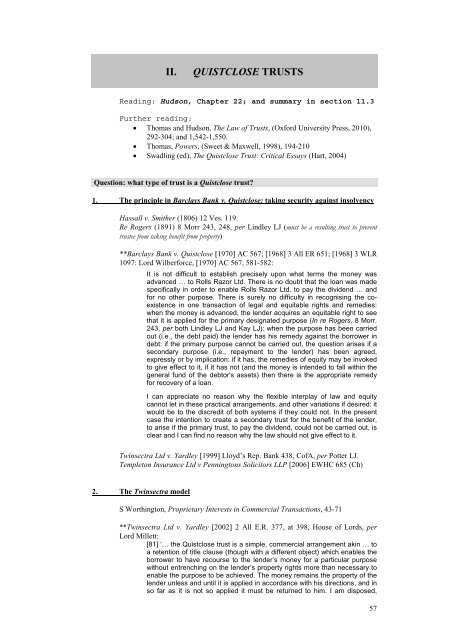Soton Equity and Trusts - alastairhudson.com
Soton Equity and Trusts - alastairhudson.com
Soton Equity and Trusts - alastairhudson.com
Create successful ePaper yourself
Turn your PDF publications into a flip-book with our unique Google optimized e-Paper software.
II.<br />
QUISTCLOSE TRUSTS<br />
Reading: Hudson, Chapter 22; <strong>and</strong> summary in section 11.3<br />
Further reading:<br />
Thomas <strong>and</strong> Hudson, The Law of <strong>Trusts</strong>, (Oxford University Press, 2010),<br />
292-304; <strong>and</strong> 1,542-1,550.<br />
Thomas, Powers, (Sweet & Maxwell, 1998), 194-210<br />
Swadling (ed), The Quistclose Trust: Critical Essays (Hart, 2004)<br />
Question: what type of trust is a Quistclose trust?<br />
1. The principle in Barclays Bank v. Quistclose: taking security against insolvency<br />
Hassall v. Smither (1806) 12 Ves. 119.<br />
Re Rogers (1891) 8 Morr 243, 248, per Lindley LJ (must be a resulting trust to prevent<br />
trustee from taking benefit from property)<br />
**Barclays Bank v. Quistclose [1970] AC 567; [1968] 3 All ER 651; [1968] 3 WLR<br />
1097: Lord Wilberforce, [1970] AC 567, 581-582:<br />
It is not difficult to establish precisely upon what terms the money was<br />
advanced … to Rolls Razor Ltd. There is no doubt that the loan was made<br />
specifically in order to enable Rolls Razor Ltd. to pay the dividend … <strong>and</strong><br />
for no other purpose. There is surely no difficulty in recognising the coexistence<br />
in one transaction of legal <strong>and</strong> equitable rights <strong>and</strong> remedies:<br />
when the money is advanced, the lender acquires an equitable right to see<br />
that it is applied for the primary designated purpose (In re Rogers, 8 Morr.<br />
243, per both Lindley LJ <strong>and</strong> Kay LJ): when the purpose has been carried<br />
out (i.e., the debt paid) the lender has his remedy against the borrower in<br />
debt: if the primary purpose cannot be carried out, the question arises if a<br />
secondary purpose (i.e., repayment to the lender) has been agreed,<br />
expressly or by implication: if it has, the remedies of equity may be invoked<br />
to give effect to it, if it has not (<strong>and</strong> the money is intended to fall within the<br />
general fund of the debtor's assets) then there is the appropriate remedy<br />
for recovery of a loan.<br />
I can appreciate no reason why the flexible interplay of law <strong>and</strong> equity<br />
cannot let in these practical arrangements, <strong>and</strong> other variations if desired: it<br />
would be to the discredit of both systems if they could not. In the present<br />
case the intention to create a secondary trust for the benefit of the lender,<br />
to arise if the primary trust, to pay the dividend, could not be carried out, is<br />
clear <strong>and</strong> I can find no reason why the law should not give effect to it.<br />
Twinsectra Ltd v. Yardley [1999] Lloyd’s Rep. Bank 438, CofA, per Potter LJ.<br />
Templeton Insurance Ltd v Penningtons Solicitors LLP [2006] EWHC 685 (Ch)<br />
2. The Twinsectra model<br />
S Worthington, Proprietary Interests in Commercial Transactions, 43-71<br />
**Twinsectra Ltd v. Yardley [2002] 2 All E.R. 377, at 398, House of Lords, per<br />
Lord Millett:<br />
[81] ‘… the Quistclose trust is a simple, <strong>com</strong>mercial arrangement akin … to<br />
a retention of title clause (though with a different object) which enables the<br />
borrower to have recourse to the lender’s money for a particular purpose<br />
without entrenching on the lender’s property rights more than necessary to<br />
enable the purpose to be achieved. The money remains the property of the<br />
lender unless <strong>and</strong> until it is applied in accordance with his directions, <strong>and</strong> in<br />
so far as it is not so applied it must be returned to him. I am disposed,<br />
57













